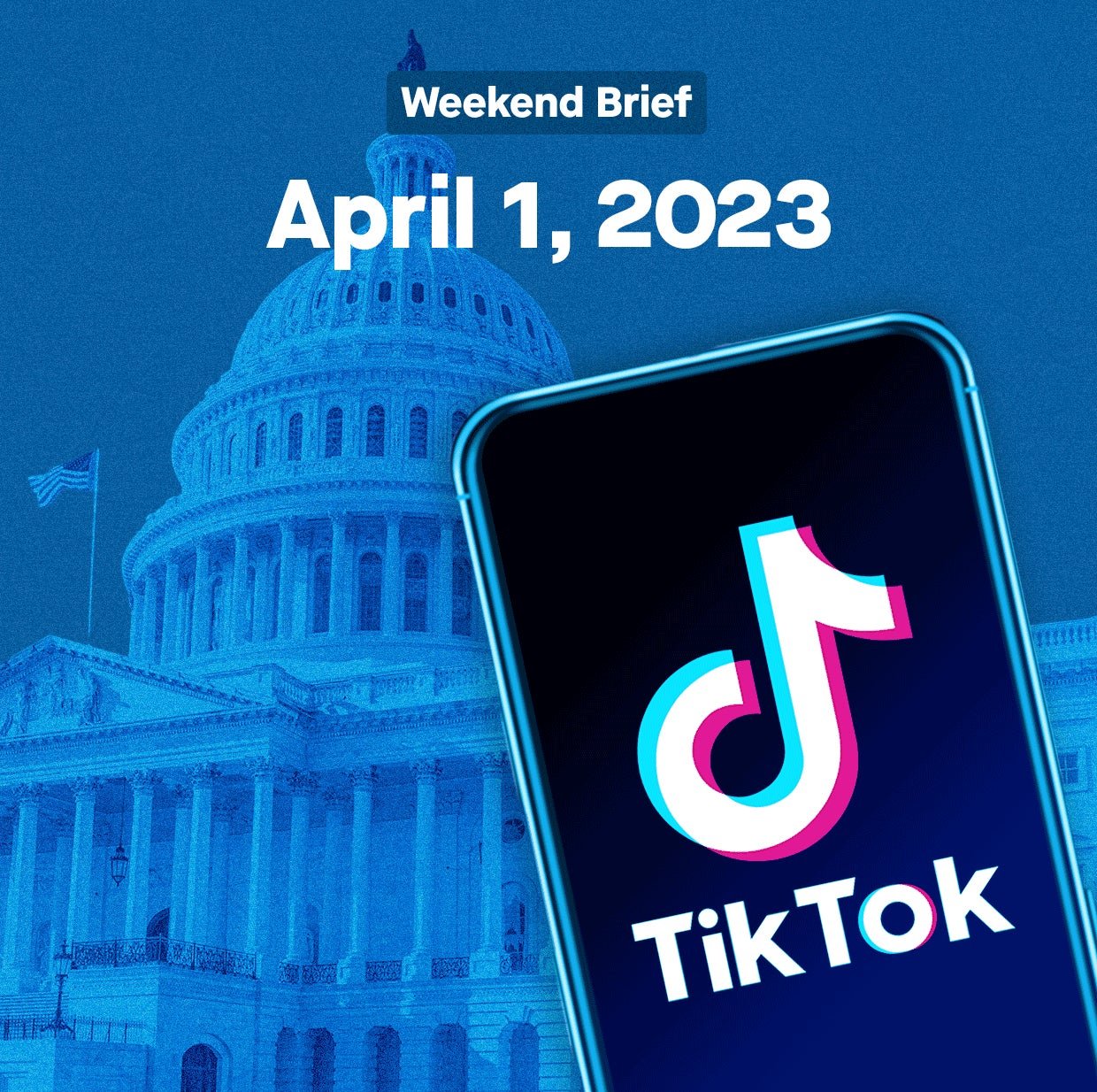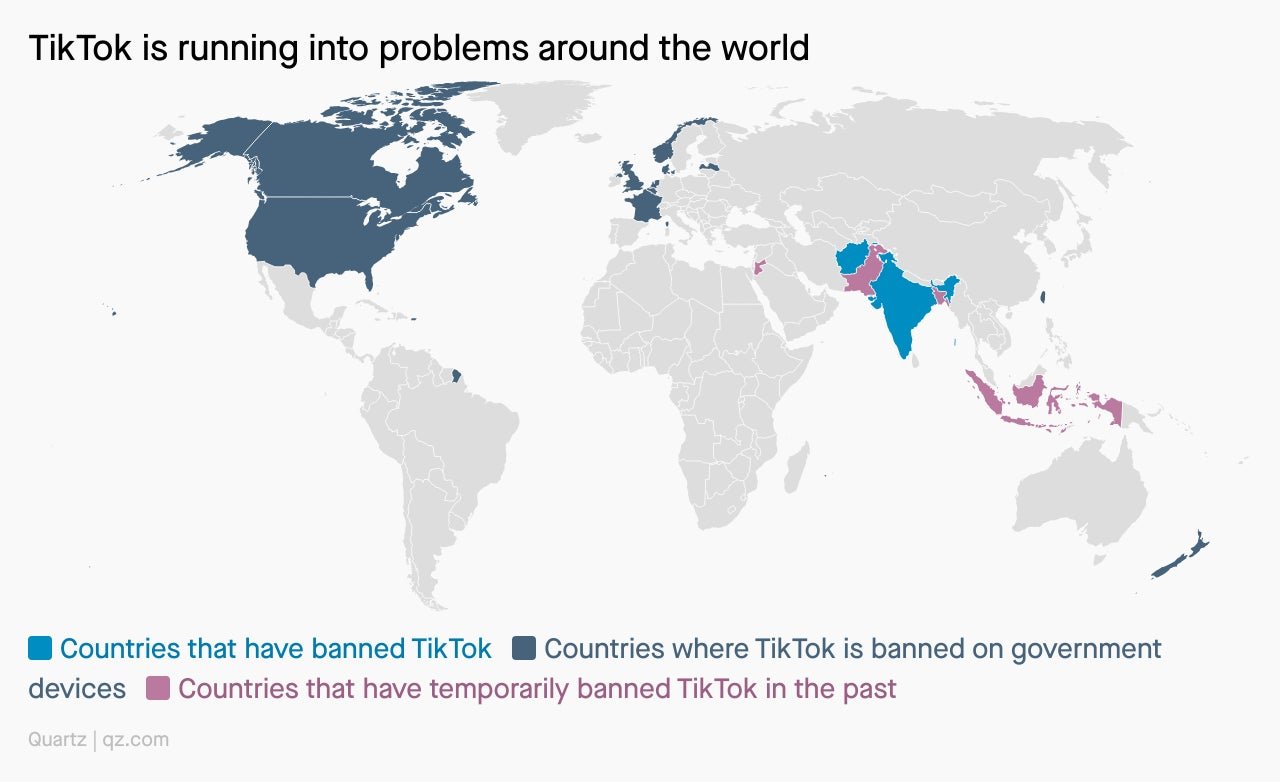The case against a TikTok ban
If the US bans TikTok, it will amount to the censorship of 150 million Americans—and still fail to keep their data from falling into Chinese hands


Hi Quartz members!
Your favorite platform for get-ready-with-me videos, vertically-oriented choreography, and midwest-emo guitar riffs could soon go dark. It’s Washington that wants to turn off the lights.
I use Washington metonymously as a stand-in for the US federal government only because this campaign is buttressed, for once, by real bipartisanship. As they showed in a recent five-hour grilling of Shou Zi Chew, TikTok’s CEO, congressional Democrats and Republicans are itching to ban TikTok, and president Joe Biden is considering it too. Biden wants to do something about the app, at any rate, even if he’s still picking out the weapon he wants to use for the coup de grâce.
While we might think of TikTok merely as the home of light-hearted videos, it has become so much more. Since the dawn of the pandemic, there has been perhaps no more important platform for speech—including political speech—in the US. But lawmakers are concerned about the geopolitical threat of TikTok, a data-gulping social media app owned by a Chinese company. And they’re ready to act, seemingly without much concern for the massive free-speech implications that will accompany a ban.
SPEECH, SPEECH!
The government has four options in front of it when it comes to TikTok:
- Do nothing.
- Congress can pass comprehensive federal privacy legislation that would protect US citizens from the excessive data collection practices of all private companies, not just those of TikTok.
- Through the Committee on Foreign Investment in the US, Biden can unilaterally force ByteDance, TikTok’s parent company, to sell TikTok to an American company in order for the app to stay operational in the US.
- Congress can pass new legislation to try to ban the app, three years after courts blocked president Donald Trump’s attempt to do just that with an executive order.
Since doing nothing seems unlikely at this point, and a comprehensive federal privacy law—the best option—isn’t under serious consideration, we’re left with the options of a forced sale or a legislated ban. Neither is good. A forced sale would set a harmful new precedent about who can own media in the US—a major government overreach into the way Americans receive and transmit information. But an all-out ban would be catastrophic for free speech in America.
In a time when the word “censorship” is thrown around willy-nilly in political debates about the power of private social media companies, a ban on TikTok is truly state-sponsored censorship—the exact kind of thing the First Amendment protects against. Not only do 150 million Americans use TikTok every month to access information, according to the company’s own numbers, but many use it to speak their mind, too. Especially since the pandemic, TikTok has become the fastest-growing platform for speech in the US. A ban on TikTok would shut down a crucial outlet through which Americans speak, and spread and receive information. And Americans have the constitutional right to receive foreign information—even if the government deems it propaganda.
A ban on TikTok would trigger a massive First Amendment battle in the courts, one that the government is unlikely to win. When Trump tried to ban TikTok in 2020, he also tried to ban the Chinese-owned app WeChat. While a federal court struck down the TikTok ban for statutory overreach and didn’t weigh in on First Amendment questions, a federal judge halted the WeChat ban because the plaintiff had demonstrated that there were “serious questions” about whether the ban violated users’ First Amendment rights.
Banning TikTok, similarly, would reek of censorship at its worst, and come off as a massive abuse of government power.
A WORLD OF TROUBLE
If the US banned TikTok nationwide, that would make it the third country to institute a permanent ban of the app on civilian devices, after India and Afghanistan. More commonly, national governments are limiting TikTok bans to government devices.

How does your company prioritize its remote workers? Nominate your company today for Quartz’s Best Companies for Remote Workers 2023. GitLab, Andela, and ClickUp are among the 83 companies that made it to the list last year. The last date for submissions is April 14, 2023. Nominate your company here!
PWNING THE OWNERS
Some regulator concerns are valid. TikTok’s data privacy practices are subpar, for instance, but so are those of US tech companies like Meta, Google, and just about every other firm that operates a so-called walled garden. It’s difficult to believe that the government cares, in the abstract, about data privacy, given that it hasn’t seriously considered a comprehensive federal privacy law—even five full years after Europe’s GDPR went into effect.
The bigger concern is that ByteDance, the Chinese owner of TikTok, cannot guarantee that it is fully shielded from Beijing’s influence and oversight. While true, a ban on TikTok alone won’t solve anything. The kind of data that TikTok collects, including geolocation data, is easily available from private data brokers who are—again—free from comprehensive regulation in the US.
Furthermore, there’s no guarantee that banning TikTok, or forcing a sale of the app, would be anything but a game of whack-a-mole. What’s to stop another Chinese company from sprouting up and building a TikTok clone?
ONE 👢 THING
TikTok’s best bet, at present, is to persuade the US government that Texas is watertight.
Project Texas is TikTok’s $1.5 billion plan to restructure its US operations. The aim is to allay fears about the security of US user data by having these operations monitored by an in-house, government-approved committee. (Why Project Texas? Because TikTok’s partner in this enterprise, Oracle, is based in Austin.) The plan went into operation last July, with the creation of a new subsidiary called TikTok US Data Security Inc., which can only hire US citizens or green card holders. The monitoring committee will be housed within this subsidiary; additionally, inspectors from Oracle and the US government will be able to go to “transparency centers”—real-world locations—where they can review TikTok’s source code.
TikTok argues this is far more oversight than any other US social media companies offer. That’s true enough. But even these unprecedented arrangements may, in the end, not be sufficient to prevent the US giving TikTok the boot.
QUARTZ STORIES TO SPARK CONVERSATION
- A royal clause is allowing Disney’s magic kingdom to circumvent DeSantis’ board for decades to come
- American women could be one Texas ruling away from losing access to mifepristone
- The WHO will consider adding obesity drugs to the list of essential medicines
- Turkmenistan is spending $5 billion to build a city honoring its strongman leader
- Meta, Microsoft, and Disney are reversing their bets on the metaverse
- More Americans than ever rely on food stamps—but cuts are coming
- Nobody has donated to Tennessee’s anti-abortion monument
5 GREAT STORIES FROM ELSEWHERE
🔧Solutionism. The tech community has sounded several warnings against the rapid development of AI systems like GPT-4, but that doesn’t mean the craze is winding down any time soon. Advocates, including OpenAI’s president, have touted AI as a powerful force for fixing the world’s problems. But that’s oversimplified thinking, argues a piece in Slate, which lays out why the logic of so-called “solutionism” is feeding the current AI hype.
😌’Tis the gift. If you’re seeking a soothing balm amid the frenetic storm of modern life, look no further than Martijn Doolaard’s YouTube channel. The Dutch content creator, who has already garnered half a million followers, posts videos documenting his gradual construction of cabins in the remote Italian alps. Outside goes offline and visits Doolaard at his homestead to discuss his work as a builder and storyteller. Henry David Thoreau quotes ensue.
🧭First explorers. A dominant narrative learned in school is that European travelers “discovered” other parts of the world on their voyages of trade and conquest. But it may well be the other way around. A piece from New Lines dives into the history of Africans making the first forays into Europe, exploring a history that spans thousands of years and includes political missions from the kingdoms of Kush, Makuria, and beyond.
🎩Rigged games. Monopoly and Yahtzee are iconic board games for family gatherings, but there’s more to the diversions than a roll of the dice. In fact, the mechanics of both games can be seen as a reflection of capitalism: There’s always a point when one player acquires so much wealth, they become virtually unbeatable. A story in Mother Jones looks at the origins (and math) behind the tabletop favorites, which in one case, is surprisingly anti-capitalist.
🍢Tofu tour. Many in the West would be familiar with tofu as a blobby white cube sitting in water, which one might drain, pan fry, and plop over a salad. But tofu, like cheese, comes in a wide variety of textures, shapes, and flavors. An essay from Asterisk takes readers on a tofu tour in China to look at everything from papery tofu sheets to exploding juice tofu.
Correction: One oversight in our last Weekend Brief mixed up “billions” and “millions.” The $219 billion in profits earned by the top six oil companies last year is, of course, sufficient to explore and drill thousands of new oil wells.
Thanks for reading! And don’t hesitate to reach out with comments, questions, or topics you want to know more about.
Have a weekend unmarred by First Amendment concerns,
— Scott Nover, tech reporter
Additional contributions by Julia Malleck and Samanth Subramanian